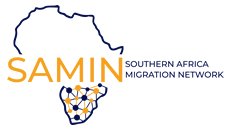
Africa Unite Policy Conference on Migration – 01 December to 02 December 2022.
On 1 December 2022, the Southern Africa Migration Network (SAMIN) will hold a regional conference, in partnership with the WITS Mining Institute (WMI) on the importance of promoting evidence-based and people-centred migration policies in contemporary South Africa. This was done through an analysis of mobility-related vulnerabilities, causes, challenges and opportunities. The Southern African Migration Network (SAMIN) is a forum that is made up of a multitude of academia, refugee and migrant rights organisations as well as human rights defenders and activists. The purpose of the regional conference is to achieve economic development, peace, and security to enhance the standard and quality of life of people living in the Southern African region. SAMIN believes that achieving these objectives will eventually led to the support of socially disadvantaged groups in their integration into the regional economy. The proposed regional policy conference will take place in Johannesburg, South Africa from 01 to 02 December 2022 and will be preceded by a one-day capacity-building training workshop for 20 SAMIN members that will take place on the 30th November 2022.
Migration flows have been and continue to be important factors of social, economic and cultural change. There are few, if any, countries in the world that are not affected by migration. In other words, migration is an essential, inevitable, and beneficial component of the economic and social life of every state and every region including the Southern Africa Development Community (SADC). However, in many SADC member countries, migration is neither managed effectively nor do countries adhere to domestic, regional and global laws that govern their admission, stay and participation in the national economy. The Regional Policy Conference will focus on forced migration. At the conference, forced migration will refer to persons or groups of persons who have been forced, obliged or induced to flee/leave their homes or places of habitual residence or nations, in particular as a result of or in order to avoid the effects of armed conflict, situations of generalized violence, political persecutions, violations of human rights, natural (or human-made) disasters or national economic crisis. The term ‘forced migration’ is understood and applies to internally and externally displaced people.
Nonetheless, SAMIN takes cognisance that both forced and voluntary migrants continue to experience various human rights violations such as labour exploitation, xenophobic attacks, discrimination (or exclusion) and other inhumane treatments. Of deep concern is that these ill treatments are widespread to such an extent that government organs and institutions such as, municipal offices, hospitals, schools, banks, social assistance centres, refugee reception centres, police stations traffic departments, and deportation centres commit them. Anti-migrant sentiments materially affects forced migrants, who look up to the host government for protection. This is true given that there is a global trend of frequently reviewing immigration and refugee laws and policies in a way that mirrors or provides tacit support for anti-migrant sentiments, through the introduction of immigration measures that are more restrictive. These measures severely restrict the fundamental rights and freedoms of those who are viewed as outsiders or as not belonging in the host community. Severe restriction of rights manifests in the long turnaround times for processing and approval of asylum claims; extension or renewal of refugee and asylum seeker permits; delays in granting a durable solution such as permanent residency or naturalisation as citizens; and the unfavourable relations between countries that results in withdrawing alternative or exemption permits granted to a particular nationality.
Recognizing the critical role of migrants-rights organisations and civil society organisations (CSOs) in lobbying and advocating for the appropriate integration of migrants (or efficient management thereof) in SADC countries. The third edition of the SAMIN Regional Policy Conference being organised in partnership with the WITS Mining Institute (WMI) will take place in Johannesburg, South Africa to mitigate the poor management and governance of the flow of migrants. The primary objective of this Regional Policy Conference is to establish and launch working teams of SAMIN in each Member State of the SADC. A working team will be tasked with duties to discuss the challenges facing forced migrants in their country in particular and in the Southern African region in general and fashion out the best way forward toward better management of forced migration issues at national and SADC levels or beyond.
Furthermore, the Regional Policy Conference aims to create an opportunity for partners to nurture networks and support research projects aimed at accelerating the understanding of the complexities of forced migration management and governance in terms of law, practice and implementation. Networking and collaboration are key elements of SAMIN’s mission; hence we will partner with like-minded initiatives in Southern Africa and beyond to make this ground-breaking international policy conference succeed. In addition, we hope to strengthen our monitoring mechanisms and partnerships to ensure that the recommendations from this conference are implemented by concerned national governments.
The above extract is taken from the conference concept note.
Categories:
Tags:

